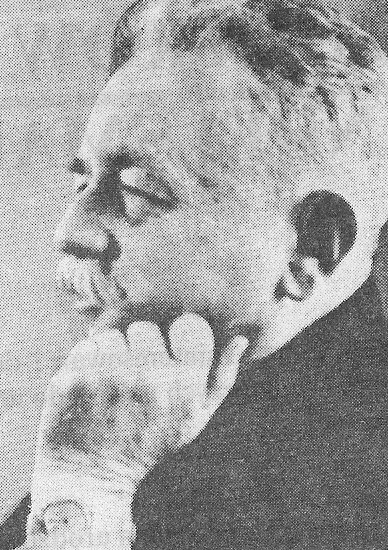|
Stanisław Arnold
Stanisław Arnold (20 December 1895 – 3 November 1973) was a Polish historian, professor of the University of Warsaw. He was a member of the Polish Academy of Sciences and chief of the Marxist Association of Historians.Bohdan Urbankowski: Czerwona msza czyli Uśmiech Stalina. T. II. Warsaw 1998, p. 154. Biography Arnold was born on 20 December 1895 in Dąbrowa Górnicza. He was the son of Jan, director of a mine, and Romana née Bojanowski. In 1920 he defended his PhD thesis ''Władztwo biskupie na grodzie wolborskim w wieku XIII'' under supervision of Marceli Handelsman. Later he became an employee of the University of Warsaw, with which he was connected until retirement in 1966. From 1924 to 1928, he was working as a history teacher at Stefan Batory 2nd High Schoolin Warsaw Warsaw, officially the Capital City of Warsaw, is the capital and List of cities and towns in Poland, largest city of Poland. The metropolis stands on the Vistula, River Vistula in east-central Pola ... [...More Info...] [...Related Items...] OR: [Wikipedia] [Google] [Baidu] |
University Of Warsaw
The University of Warsaw (, ) is a public university, public research university in Warsaw, Poland. Established on November 19, 1816, it is the largest institution of higher learning in the country, offering 37 different fields of study as well as 100 specializations in humanities, Engineering, technical, and natural sciences. The University of Warsaw consists of 126 buildings and educational complexes with over 18 faculties: biology, chemistry, medicine, journalism, political science, philosophy, sociology, physics, geography, regional studies, geology, history, applied linguistics, philology, Polish language, pedagogy, economics, law, public administration, psychology, applied social sciences, management, mathematics, computer science, and mechanics. Among the university's notable alumni are heads of state, prime ministers, Nobel Prize laureates, including Joseph Rotblat, Sir Joseph Rotblat and Olga Tokarczuk, as well as several historically important individuals in their res ... [...More Info...] [...Related Items...] OR: [Wikipedia] [Google] [Baidu] |
Polish Academy Of Sciences
The Polish Academy of Sciences (, PAN) is a Polish state-sponsored institution of higher learning. Headquartered in Warsaw, it is responsible for spearheading the development of science across the country by a society of distinguished scholars and a network of research institutes. It was established in 1951, during the early period of the Polish People's Republic following World War II. History The Polish Academy of Sciences is a Polish state-sponsored institution of higher learning, headquartered in Warsaw, that was established by the merger of earlier science societies, including the Polish Academy of Learning (''Polska Akademia Umiejętności'', abbreviated ''PAU''), with its seat in Kraków, and the Warsaw Society of Friends of Learning (Science), which had been founded in the late 18th century. The Polish Academy of Sciences functions as a learned society acting through an elected assembly of leading scholars and research institutions. The Academy has also, operating throug ... [...More Info...] [...Related Items...] OR: [Wikipedia] [Google] [Baidu] |
Bohdan Urbankowski
Bohdan Urbankowski (19 May 1943 – 15 June 2023) was a Polish writer, poet, and philosopher. An opposition activist in the People's Republic of Poland, he received several awards for his publications, most of which were published underground (''bibuła''). Urbankowski was the author of over 40 books, including many biographies including those of Adam Mickiewicz, Józef Piłsudski and John Paul II. Urbankowski died on 15 June 2023, at the age of 80. Selected works *''Dostojewski - dramat humanizmów''. 1978 *''Czerwona msza, albo usmiech Stalina'' (''The Red Mass, or Stalin's Smile''). 1995, 2011 *''Józef Piłsuds ...[...More Info...] [...Related Items...] OR: [Wikipedia] [Google] [Baidu] |
Dąbrowa Górnicza
Dąbrowa Górnicza () is a city in Zagłębie Dąbrowskie, southern Poland, near Katowice and Sosnowiec. It is located in eastern part of the Silesian Voivodeship, on the Czarna Przemsza and Biała Przemsza rivers (tributaries of the Vistula River, Vistula, see Przemsza). Even though Dąbrowa Górnicza belongs to the historic province of Lesser Poland, it now is situated in the Silesian Voivodeship. Dąbrowa Górnicza is one of the cities of the Katowice urban area (2.7 million people), and within the greater Katowice-Ostrava metropolitan area (5.2 million people). The population of the city itself as of December 2021 is 116,971. Nature In Dąbrowa there are many green areas. Total area of local lakes is over 800 hectares, there are 180 hectares of parks (0.96%) and 4100 hectares of forests (21.7%). Particularly noteworthy is the complex of Pogoria (lakes). Furthermore, part of the Eagles' Nests Landscape Park reaches the outskirts of the city. The largest desert in P ... [...More Info...] [...Related Items...] OR: [Wikipedia] [Google] [Baidu] |
Marceli Handelsman
Marceli Handelsman (1882–1945) was a Polish historian, a Warsaw University professor, medievalist, modern historian, and historical methodologist. Life Marceli Handelsman was born on 8 July 1882, in Warsaw, to a family of distant Jewish ancestry. After graduating in law from the Russian-language Imperial Warsaw University, he moved to Berlin, where he began studies in the history department of Unter den Linden University. In 1906, however, he was dismissed from the school because of his involvement in socialist organizations. Afterwards Handelsman continued his studies at various European universities including Paris, Zürich (where he received his doctorate in 1908), Rapperswil, Vienna and finally London. During World War I, in 1915, he returned to Warsaw and joined Warsaw University as a professor of modern history. He was also appointed a member of the Polish Academy of Learning. One of the most prominent historians of the age, between 1918 and 1939 he was also the editor ... [...More Info...] [...Related Items...] OR: [Wikipedia] [Google] [Baidu] |



